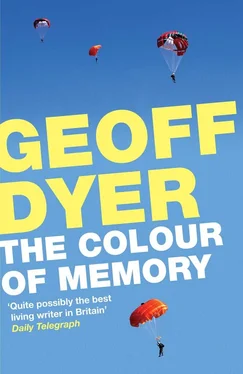With this in mind, I spent the rest of the day re-activating my social security claim. Since I’d last been to the DHSS offices a month before, they’d spruced the place up a bit. In particular they’d put in a thicker plate-glass partition and lowered the claimant’s side of the counter so that you actually ended up on your knees and yelling, as if praying to a deaf and bureaucratic God.
I left the dole office and shook my head at the pavement-faced guy selling a revolutionary tabloid. Across the road the pale sun brightened the colours in the huge Nuclear Dawn mural showing a spectral figure of death clad in stars and stripes, striding over the dwarfed, fish-eyed landmarks of London. Bricks, their colours slowly warming in the weak sun, would have looked nicer but that was probably not a relevant consideration any more.
Immediately behind the mural was the railway bridge. After the uprisings the local traders paid for huge ‘Welcome to Brixton’ hoardings to be hung from the bridge. Now only a few tatters were left to cover the blank boards. A train clanked overhead, pulling a long freight of dangerous-looking, toxic-coloured containers towards some unspecified zone where no one was sure what happened. An innocent possibility of horror, the train clunked and screeched past. Further off, visible over the moving freight, were the large letters ATLANTIC forming a balcony on the roof of the pub.
Outside the pub Luther shook his coffee jar and asked for money. Years ago I used to see him in the George Canning, wearing a combat jacket and selling his paintings which were bright and colourful. People who hadn’t seen him before were fascinated and he always managed to shift a few. Then, after seeing him in the boozer selling the same paintings night after night people stopped taking any notice. The more trouble he had selling paintings the harder he hustled. The landlord barred him and things began going badly. I saw him in various places, wearing the same green combat jacket but looking less like an artist and more like somebody with time not paint on his hands. By the time of Band Aid he was reduced to roaming around Brixton with a coffee jar, an optimistically wide slot cut into its green lid and a label saying BAND AID: PLEASE GIVE GENEROSLY. ETHIPIA FAMINE. The jar was never quite empty; there were always a few bronze coins in the bottom like half-an-inch of beer in a glass. After Band Aid he rationalised his enterprise still further by taking off the label and throwing away the lid.
Until today I hadn’t seen him for a couple of months and in that time he’d slid a few inches nearer to destitution. His combat jacket had big rips in it; one sleeve was in shreds as though he’d been mauled by a spiteful dog. He shook the tin at me, still trying to maintain that he was not begging but collecting.
‘Who’s it for?’ I asked.
He paused for a moment, looked me up and down and mumbled, ‘Nicaragua.’
I dropped some coins into his jar. Back at Freddie’s I circled the phone and played the start of some records, looked out of the window at the nothing-happening grey of the sky, turned a tap on and off, read one and a half lines of the paper and then put it down again. I turned on the TV and found horse-racing on both sides. I watched for about twenty minutes, ignoring the horses and concentrating instead on the suburban hinterland in the background: a place where it always drizzled, a place that didn’t look like anywhere. I turned the TV off, picked up one of Freddie’s books and studied the Olympic coffee rings on the cover. I rehearsed things I might say if someone turned up. I rang Fran and left another message. I called Freddie, heard the engaged sound, tried again and then remembered that I was actually at Freddie’s and had dialled my own number. I called Steranko and a voice said he was out. I called Carlton but there was no answer. Where was everybody?
The doorbell rang just as I turned on the TV to watch the news. I trudged along the hallway and opened the door.
‘Fran!’
‘Hi!’
We kissed and held each other.
‘How did you know I was here?’
‘I was in Brixton anyway. I called home and they gave me your message.’
‘I’m so glad to see you. I’m so miserable.’
‘Why?’ We were walking back along the corridor to Freddie’s kitchen.
‘I got sacked from my job.’
‘Again?’ Fran laughed. I nodded. ‘You’re going to end up in the Guinness Book of Records.’
‘It’s not funny.’
‘No, I know. I thought you said it was an awful job though.’
‘It was. Now I’ll have to get an even worse one. What will I say when a prospective employer asks what I’ve been doing for the last two years? That I’ve been in prison, studying for a sociology degree with the Open University?’ I put my arms around Fran: it couldn’t be described as a hug — I just put my arms around her and leaned.
‘You feel thin,’ she said.
‘So do you.’
‘We’re a thin family.’
‘Built for speed,’ we said together, quoting our mother.
Fran was wearing a beat-up suede jacket, very baggy light trousers rolled up above her ankles, old suede shoes and faded yellow socks. Her hair looked like it had just been cut. I filled the kettle through the spout and sat down, resting my head on my hands.
Fran and I didn’t meet up regularly. Often I wasn’t even sure where she was living and would go a couple of months without seeing her. Then, just as I was beginning to wonder what had happened to her, when I was wanting quite badly to see her, she’d turn up or we’d run into each other.
‘Why are you holding your head?’ she said suddenly.
‘Not because I’ve got a headache.’
‘That’s a weird answer. OK. Why aren’t you holding your head?’
‘I am ,’ I said and stood up to make the tea.
‘What were you doing?’ Fran said. ‘When I arrived, I mean.’
‘Lamenting my lot — my little. And thinking about the slippery slope.’
‘What about it?’
‘I was wondering where you slipped to.’
‘A blind alley probably — through there to a park bench and meths. What else were you thinking about?’ She was leaning against the door frame, one foot resting on the thigh of her other leg.
‘Nothing really. I was just waiting for time to pass.’
‘Time is money,’ said Fran. ‘I saw that sprayed on a wall near my house a couple of days ago. Then today I saw that somebody had changed the ‘is’ to an ‘isn’t’. People spray weird things these days. You see something like that sprayed on a wall and suddenly it looks like some kind of prophecy. You wonder if you know what it means.’
‘Well, if time was money I’d have paid this afternoon into my account. I bet there are people who’d give their right arm for an extra couple of hours. I’d have been happy to loan them a couple of mine — I’d have given them away. Anything to have got them off my hands.’
‘You should have been with me yesterday,’ Fran said. ‘I was sitting on a park bench and this man asked me where some road was. I didn’t know exactly where it was but I pointed in the general direction. Then about ten minutes later the same man came charging up in an absolute fury. “You sent me the wrong way you silly bitch,” he was saying. Absolutely furious. “You owe me ten minutes. Ten minutes, and I want them now!” I thought he was going to kill me.’
‘What did you do?’
‘I jumped on a passing bus.’
As I washed out some cups Fran walked by the kitchen table and banged her hip on the fridge.
‘Ow! That hurt,’ she said, absently rubbing her hip and sitting down. She was always banging into things or knocking them over. When we were kids our father used to tell her not to be so careless and to look after things but you could tell that really he was worried about Fran hurting herself. As Fran got older this concern subsided into a bemused and tender attention to the way she navigated her way through the world. I had more or less inherited this tendency of his and often found myself fascinated by her movements, wondering what would happen next. There was something graceful about her awkwardness. Several times I’d seen her knock a bottle off the edge of a table and then catch it before it hit the ground. For her part Fran paid little attention to these bruises and knocks — as if even when things hurt her there was some level at which she didn’t feel them.
Читать дальше












